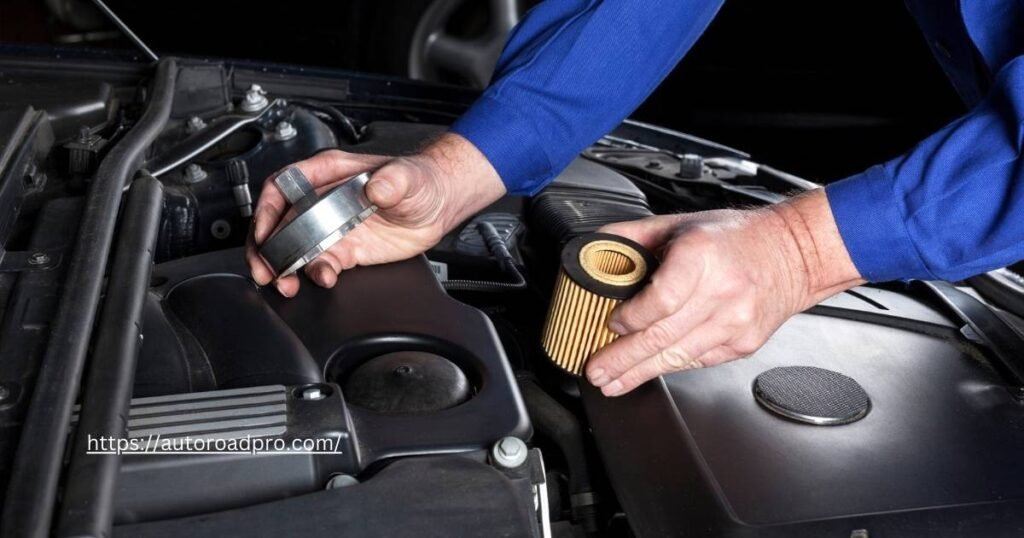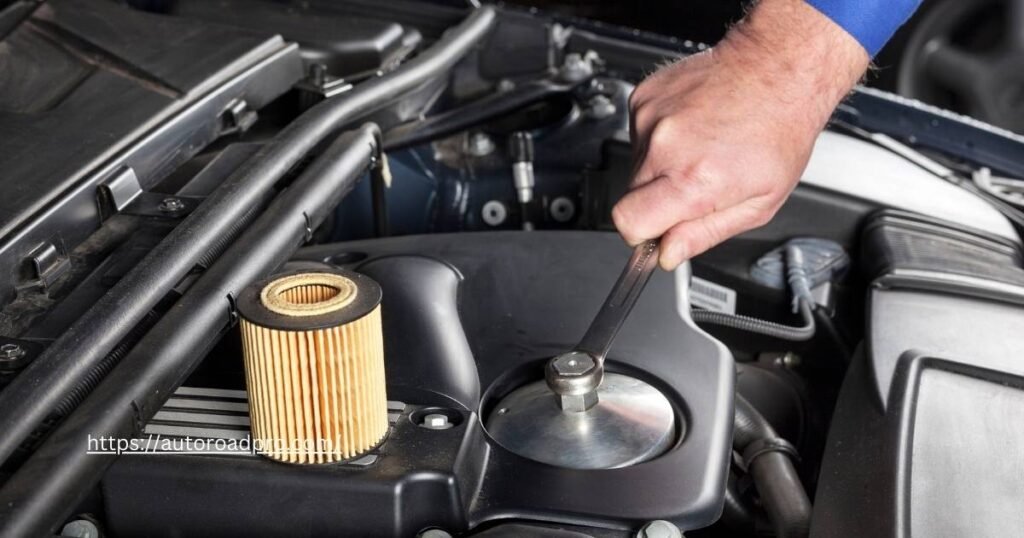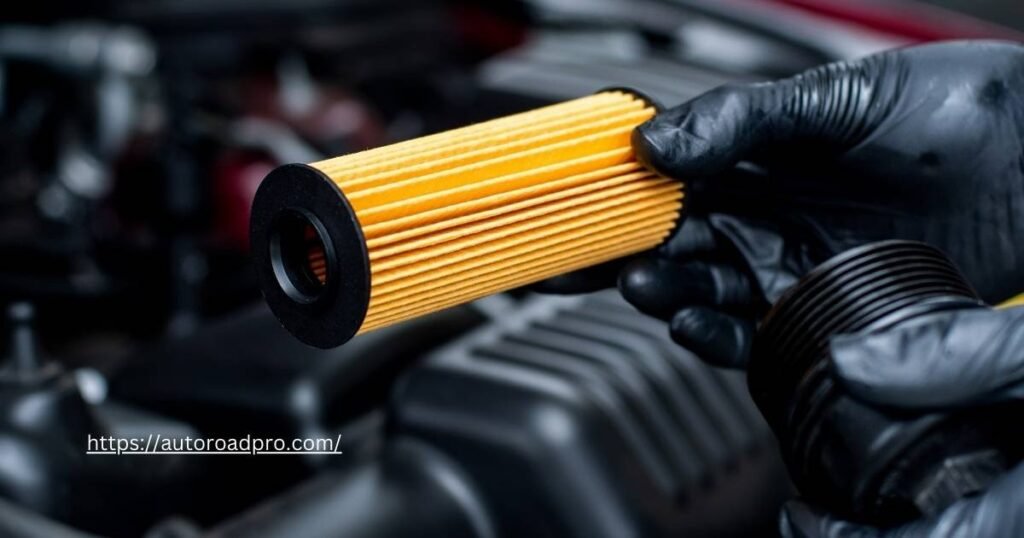The oil filter, often overlooked in routine car maintenance, plays a vital role in preserving the health and performance of your engine. This unsung hero tirelessly removes harmful contaminants like dirt, metal shavings, and carbon deposits from your engine oil, ensuring it remains clean and effective.
Clean oil lubricates engine components efficiently, minimizing friction and wear, leading to a longer lifespan for your car.
Table of Contents
How Often Should I Change My Oil Filter?
While manufacturers generally recommend changing the oil filter every second oil change (around 3,000 to 6,000 miles and you can also do it around 12,000 miles for modern vehicles), many mechanics suggest replacing it with every oil change, especially for newer engines with highly efficient filters that capture finer particles and clog faster.

What Factors Influencing Frequency of Alteration of Oil Filter?
Driving Habits: Harsh driving, frequent stop-and-go traffic, and harsh conditions necessitate regular oil and filter changes.
Dash Lights: A lit service engine light could indicate a clogged filter requiring immediate replacement.
Make and Model: Different car models may have specific oil filter change interval recommendations. Consult your owner’s manual for precise guidance.
Dirty exhaust fumes: Excessive smoke or dark-colored exhaust can indicate unfiltered contaminants burning in the engine.
Strange engine noises: Grinding, knocking, or clicking sounds can indicate increased friction due to poor lubrication, possibly caused by a clogged oil filter.
Why is the Oil Filter changed?
Imagine your engine as a powerful machine constantly battling microscopic contaminants. The oil filter acts as a shield, capturing and removing harmful particles like dirt, metal shavings, and carbon deposits circulating within the engine oil.

If left unchecked, these contaminants can cause significant damage to internal components, leading to costly repairs and reduced engine lifespan.
What are the Signs of a Clogged Oil Filter?
Ignoring your oil filter’s health can lead to a domino effect of issues within your engine. Here are some telltale signs that your oil filter needs immediate replacement:
- Metallic sounds: Clogged filters restrict oil flow, causing increased friction and metallic grinding or knocking noises emanating from the engine.
- Black, dirty exhaust: Healthy exhaust emissions are typically precise or have a slight bluish tinge. Black, sooty exhaust indicates incomplete combustion, often caused by poor oil filtration.
- Burning oil smell: A distinct burning oil odor wafting from the engine bay indicates oil leaks, often caused by pressure build-up from a clogged filter.
- Sputtering engine: A sluggish engine performance, accompanied by hesitation and sputtering, can be attributed to inadequate oil lubrication due to a clogged filter.
- Drop in oil pressure: The dashboard’s gauge is a vital indicator. A significant pressure drop signifies reduced oil flow, often caused by a compromised filter.
What are the key things you should keep in mind?
While manufacturer recommendations should be prioritized, here are some general guidelines for oil filter replacement.
Replacing the oil filter with every oil change is the safest and most recommended practice to ensure optimal engine protection.
However, for vehicles with extended oil change intervals, replacing the filter every other oil change can be considered.
Regardless of the scheduled replacement interval, it’s crucial to monitor for signs of a clogged filter, such as decreased engine performance, increased oil consumption, engine noise, or warning lights, and replace it promptly to maintain engine health.
What are the benefits of regular changes to the oil filter?
Maintaining a consistent oil filter replacement schedule offers numerous benefits:
- Enhanced engine performance: A clean oil filter ensures optimal oil flow, improving engine power, efficiency, and responsiveness.
- Reduced wear and tear: Effective oil filtration minimizes contact between metal parts, preventing premature wear and tear and extending engine life.
- Lower fuel consumption: A smooth-running engine consumes less fuel, increasing fuel efficiency and cost savings.
- Improved emissions: A properly functioning engine with clean oil produces cleaner exhaust emissions, contributing to a healthier environment.
Here are some dealerships that do offer oil filter changes.
| Provider | Oil Filter Price | Filter Replacement Service | Notes |
| Walmart | $10-$15 (conventional) $15-$20 (synthetic) | Included with oil change | Variable: contact a local store for an estimate |
| Valvoline | $10-$20 | contact a local store for details | Price varies depending on filter type and vehicle. Additional labor charges beyond the filter price. |
| Jiffy Lube | $10-$20 | contact a local store for an estimate | Similar pricing to Valvoline. Additional labor charges apply. |
| Meineke | $15-$25 | Included in some oil change packages is an additional charge for standalone service. | Prices may be slightly higher than other providers. Additional labor charges apply. |
| Pep Boys | $10-$20 | Check with the local store for details. Prices may vary depending on location. | Variable: inquire about the total cost before service. |
| Independent Mechanic | $5-$25 | Prices can vary significantly depending on the mechanic and their service offerings. Labor charges may be lower than in chain stores. Check online reviews and ask for recommendations to find a reputable mechanic. | Prices can vary significantly depending on the mechanic and their service offerings. Labor charges may be lower than chain stores. Check online reviews and ask for recommendations to find a reputable mechanic. |
| Do-It-Yourself (DIY) | $5-$20 | N/A | Filter prices vary based on your choice. Requires tools and knowledge. Most cost-effective but time-consuming. Need equipment like a drain pan, funnel, wrench, jack, and jack stands. Proper oil disposal is needed; find a recycling center that accepts it. |
How long does it take to change the oil filter?
The average time to change an oil filter ranges from 20 to 45 minutes. This timeframe depends on several factors, including:
- Vehicle type: Accessing the filter can vary in difficulty depending on the vehicle.
- Oil and filter type: Different oils and filters may require different procedures or tools.
- Mechanic skill level: A skilled mechanic can complete the job faster than a beginner.
- Tool and equipment availability: The necessary tools can save time.
While some sources suggest a 15-minute completion time at express shops like Jiffy Lube, Take 5, or Valvoline, this may not include waiting time or service quality. While a local mechanic may take longer, they may provide more personalized and thorough service.
Closing Thoughts
Ultimately, the ideal oil filter change interval depends on factors like your car’s age, driving habits, and the type of filter used. While manufacturers recommend changing it every second oil change (around 3,000-6,000 miles, and for modern vehicles, you can do it around 12,000 miles), many mechanics suggest replacing it with each oil change for optimal engine protection.
FAQs
How Long Does an Oil Filter Last?
Typically, oil filters last 3 months or 3,000 miles, whichever comes first. However, your owner’s manual provides the manufacturer’s recommendation, which is ultimately the most reliable source. Factors like oil type, filter type, driving conditions, and engine condition can affect your oil filter’s lifespan.
How do I know when my oil filter needs replacing?
Maintenance light illuminated
Oil appears excessively dark or thick.
Engine overheating
Strange engine noises
Check the engine light on
Low oil pressure
Performance or fuel economy drop
Oil or exhaust smells inside the cabin
Oil leaks under the vehicle
Recommended mileage or time interval exceeded
Is it Okay to Change the Oil but not the Filter?
Technically, yes, but changing both together is the best practice. The filter removes large pollutants from engine oil, and replacing both ensures smooth operation. Skipping filter changes can lead to the following:
- Reduced engine efficiency
- Overheating
- Sludge and deposit buildup
- Lower fuel economy
Some change oil more frequently, but this may not be beneficial as the old filter can contaminate the new oil. Therefore, always adhere to manufacturer recommendations or change both oil and filter together.
How Often Should I Replace the Oil Filter?
Generally, change the oil filter every 3 months or 3,000 miles, whichever comes first. However, this can vary depending on:
- Oil filter type
- Oil type
- Operating conditions
- Manufacturer’s recommended service interval
Some filters may last up to 10,000 miles with synthetic oil and normal driving conditions. You can also check your vehicle’s maintenance reminder system or oil life monitor for scheduled changes.


